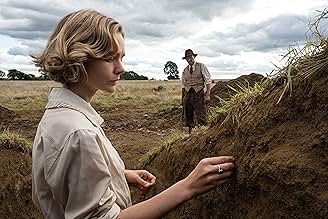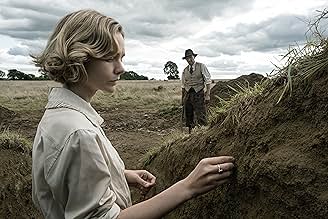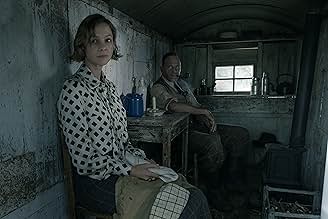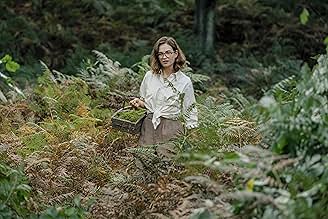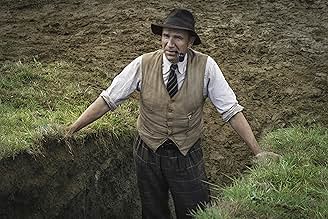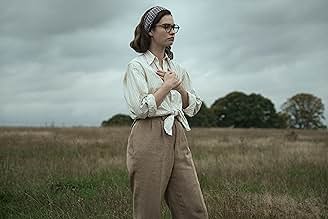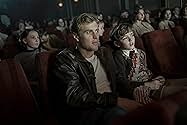An archaeologist embarks on the historically important excavation of Sutton Hoo in 1938.An archaeologist embarks on the historically important excavation of Sutton Hoo in 1938.An archaeologist embarks on the historically important excavation of Sutton Hoo in 1938.
- Nominated for 5 BAFTA Awards
- 3 wins & 11 nominations total
- Director
- Writers
- All cast & crew
- Production, box office & more at IMDbPro
Featured reviews
So rare to watch a wonderfully gentle but poignant film. It tugs at the emotions as it tells a largely true. Some liberties are taken with the truth but largely accurate. The real story of Peggy Piggott is fascinating and worth a film in itself. However the real stars of the story are Edith Pretty and Basil Brown portrayed brilliantly by Mulligan and Fiennes. One small criticism is that Carey Mulligan is too young for the part but she carries it off superbly and the performance by Ralph Fiennes is one of the best I have seen in a long time. The whole cast is superb and the backdrop of imminent war is ever present throughout the film. I have visited Sutton Hoo a number of times and studied the excavation and I still marvel at the work Basil Brown did. As an archaeologist myself I can say his work even by today's standards was of the highest order. Many of the academic archaeologists before and after WW2 were useless when it came to excavation and recording it. Basil Brown did everything right and it is fantastic he is at last getting the credit he deserved and that Edith Pretty wanted for him. It is to the great shame of the academic establishment it has taken so long. The film portrays this extremely well.
An intriguing little piece of British history, The Dig tells a slow-burning story with understated and genuine drama throughout, turning what could have been a rather dry tale of archaeology into a genuinely gripping character drama. Its historical context takes a little while to become fully relevant, but ultimately, The Dig really proves itself as a captivating watch.
One of the things that I really liked about The Dig was its patience. Never dragging yet never rushing, the film takes its time to build up all of its main strengths, from its characters, their emotional back stories, and the overarching historical context of the outbreak of World War II.
Complete with elegant camerawork, a beautiful score and impressively atmospheric direction that makes it an eye-catching watch from the first few moments, The Dig has enough confidence and depth to keep you engrossed even if its story isn't advancing apace, something that's a lot harder to pull off than you may think.
One of the big reasons that the film's patient pacing and style work so well is because of its understated, genuine drama. With calm yet fully convincing performances across the board, particularly from Ralph Fiennes and Carey Mulligan, this isn't a showy period drama by any means, but eases you into a story about real people, making them the centre of attention far more than the historical significance of the event.
I'm not particularly well-versed in archaeology, and I didn't know about this discovery before watching this film. I think that might be the case for many other people, but the great thing about The Dig is that it's primarily a character-driven drama, and one that uses emotional intrigue to bring you closer to the story at hand and allow you to appreciate its importance.
One element where the film does seem to falter is in its use of the historical backdrop of the lead-up to World War II. Set in the summer months of 1939 before the outbreak of war, there are sporadic references to the coming conflict through the first two acts of the movie, but they don't seem to bear much relevance to this story about an archaeological find.
However, the film slowly begins to unveil how the historical context plays into its characters' personal lives and the fate of the dig itself, with dramatic focus shifting significantly in the final act, but just at the right point that the sudden arrival of the war into everyday life feels just like what it would have been like to experience it first-hand, taking over everything seemingly normal in an instant.
As a result, while the historical backdrop seems almost contrived at first, it really comes good as the film progresses, another demonstration of how the patience of The Dig really plays into its hands throughout.
One of the things that I really liked about The Dig was its patience. Never dragging yet never rushing, the film takes its time to build up all of its main strengths, from its characters, their emotional back stories, and the overarching historical context of the outbreak of World War II.
Complete with elegant camerawork, a beautiful score and impressively atmospheric direction that makes it an eye-catching watch from the first few moments, The Dig has enough confidence and depth to keep you engrossed even if its story isn't advancing apace, something that's a lot harder to pull off than you may think.
One of the big reasons that the film's patient pacing and style work so well is because of its understated, genuine drama. With calm yet fully convincing performances across the board, particularly from Ralph Fiennes and Carey Mulligan, this isn't a showy period drama by any means, but eases you into a story about real people, making them the centre of attention far more than the historical significance of the event.
I'm not particularly well-versed in archaeology, and I didn't know about this discovery before watching this film. I think that might be the case for many other people, but the great thing about The Dig is that it's primarily a character-driven drama, and one that uses emotional intrigue to bring you closer to the story at hand and allow you to appreciate its importance.
One element where the film does seem to falter is in its use of the historical backdrop of the lead-up to World War II. Set in the summer months of 1939 before the outbreak of war, there are sporadic references to the coming conflict through the first two acts of the movie, but they don't seem to bear much relevance to this story about an archaeological find.
However, the film slowly begins to unveil how the historical context plays into its characters' personal lives and the fate of the dig itself, with dramatic focus shifting significantly in the final act, but just at the right point that the sudden arrival of the war into everyday life feels just like what it would have been like to experience it first-hand, taking over everything seemingly normal in an instant.
As a result, while the historical backdrop seems almost contrived at first, it really comes good as the film progresses, another demonstration of how the patience of The Dig really plays into its hands throughout.
I was excited to see a film that portrays 1930's England, and Ralph Fiennes and Carey Mulligan are proven actors that bring a unique presence to their films. Archeology might be a tough sell for the premise of a film and it was these actors that drew me in. The first half gets it so right, it's just about the time period and characters digging while becoming excited as they unearth the past, it's rather simple yet these actors have no trouble keeping you interested. In fact it was refreshing to see English people presented on screen becoming excited over finding evidence of their ancestors and past to this ancient land given the current hostile attitude towards the English and Celtic peoples by particular political groups and media companies who like to remind us we have little culture and heritage.
Then suddenly it's as if the writers thought viewers would become bored and in comes a new character, a rather modern-behaving "liberated" female with her controlling husband, inserted into the plot to remind us how women should really behave in the current age as if we needed reminding. The key characters become background noise, and you have this love triangle develop, the film takes on a different purpose, I'd rather see more character development between the man who discovered the relics and the museum trying to take credit from the little man.
Then suddenly it's as if the writers thought viewers would become bored and in comes a new character, a rather modern-behaving "liberated" female with her controlling husband, inserted into the plot to remind us how women should really behave in the current age as if we needed reminding. The key characters become background noise, and you have this love triangle develop, the film takes on a different purpose, I'd rather see more character development between the man who discovered the relics and the museum trying to take credit from the little man.
There are so many really good things about this movie, such a great piece of story telling.
The cast is excellent and all put in great performances, especially Lily James and Ralph Fiennes.
It's not just about an archaeological dig though, it's about past lives, present lives and how things are remembered in the future.
There are also several strands to the relationships between all invloved too, including working relationships, family relationships, class and secret relationships.
I don't know how much of the story is fiction or fact but it is well told either way. All this set with a backdrop of the coming second world war.
I am lucky enough to have seen the Sutton Hoo treasures at the British Museum and have always been keenly interested in archeology so this film based on the true story of this discovery was right up my street.
There is a lot I can say about this film, but I'll keep it short.
If you love simple stories being told in a beautiful and clear manner, and if you like Archaeology, then this is the film for you. All of the actors have done a wonderful job.
Did you know
- TriviaReimagines the events of the 1939 excavation of Sutton Hoo near Woodbridge, in Suffolk, England. It is the site of two early medieval cemeteries that date from the 6th to 7th centuries. One cemetery had an undisturbed ship burial with a wealth of Anglo-Saxon artifacts. Most of these objects are now held by the British Museum.
- GoofsEdith's son Robert can be seen wearing an aluminium foil hat early in the movie, Aluminium foil did not surface until after the war, but tin foil had existed since the 19th century.
- Quotes
Basil Brown: Robert, we all fail. Every day. There are some things we just can't succeed at no matter how hard we try. I know it's not what you want to hear.
- ConnectionsFeatured in Jeremy Vine: Episode #4.25 (2021)
- SoundtracksLa Rejouissance (Allegro)
Written by George Frideric Handel
Public Domain
Arranged by Julian Kershaw
Performed by Alder Valley Brass
- How long is The Dig?Powered by Alexa
Details
Box office
- Gross worldwide
- $693
- Runtime
- 1h 52m(112 min)
- Color
- Sound mix
- Aspect ratio
- 2.00 : 1
Contribute to this page
Suggest an edit or add missing content







